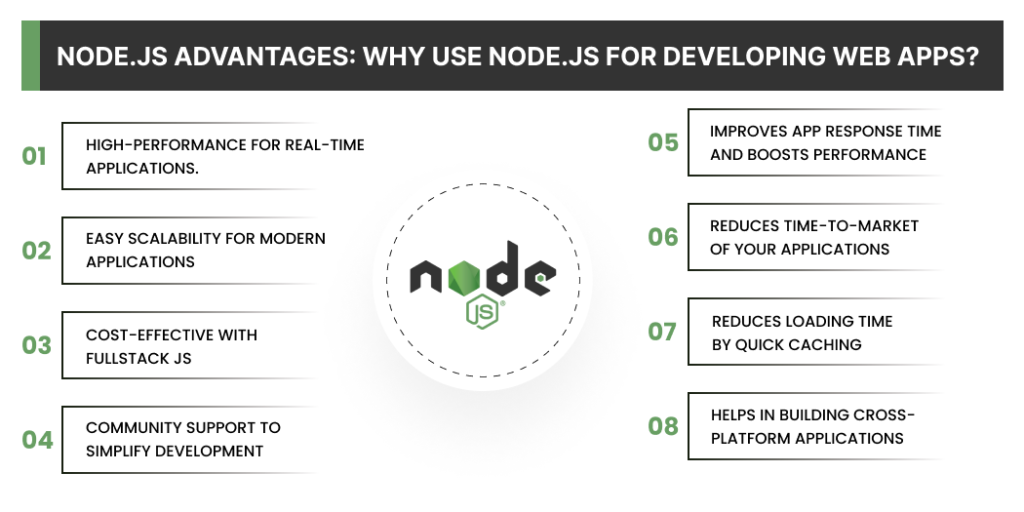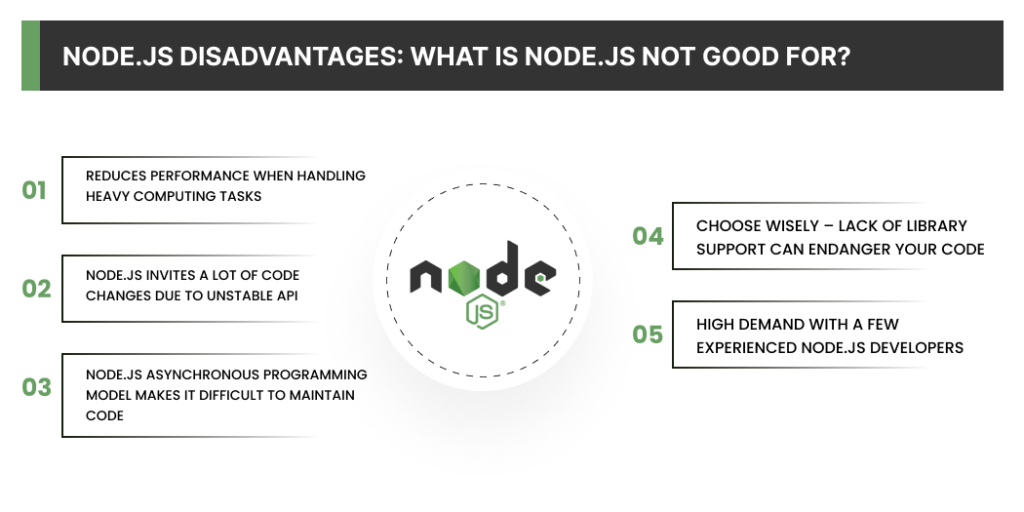How ChatGPT and RPA are Transforming Automation’s Future
May 17, 2024
Home >> Node.JS >> Node.js Advantages and Disadvantages – Why Should I Use It?

Have you ever wondered why Node.js is the first choice for developing web apps? And why use node js? What is node.js used for? If so, you’ve come to the right place! In this blog, we’ll go over the advantages and disadvantages of Node.js, as well as look at some use cases to help you understand how it can add value to your projects. Here in this blog you can explore some of the node.js advantages and disadvantages & decide when you should use node.js.
You need to explore the pros and cons of node js before you decide to choose it to build web apps. There are numerous factors that a CTO or a tech expert must consider when understanding node js advantages and disadvantages of node js for your web app. For example, technological scalability, speed, performance, application limitations, and so on. Decisions made at this stage determine how quickly your application will be available on the market. JavaScript is the most popular client-side programming language on the web. Things we could do with JavaScript on the server side were limited. Here you can see some node.js pros and cons of server-side JavaScript.

You can consider it as one of the main advantages of nodejs that you can use. The impact of a sluggish and unresponsive application can reduce a business to shards. There are many benefits of using node.js to create different types of web applications. Node.js, on the other hand, has been a shining knight, saving web and mobile apps with its powerful and adaptable personality. Indeed, according to the Node.js 2018 User Survey, over 85% of respondents used the Javascript runtime for their web applications. Furthermore, it was suggested that the average usage consistency of Node.js lasted more than two years, giving it an advantage over its competitors.
In this blog, you can see a detailed look at the pros and cons of node.js for web app development. So, what are the node.js benefits that have enticed businesses over the years? Let us investigate!
You can say that high performance for real-time applications is one of the Node js benefits. One advantage of node.js is the ability to create supercharged applications that display results in the blink of an eye. The ability to multitask greatly benefits Node.js-powered web applications. Unlike other platforms, its single-threaded, event-driven architecture efficiently handles multiple concurrent requests without clogging RAM.
Furthermore, it’s event-loop and non-blocking I/O operations enable code execution at a rate that has a significant impact on the overall performance of the application. Google has introduced the V8 benchmark suite to improve node.js performance with faster execution, better compilers, security patchworks, and the ability to scale.
Node.js uses a non-blocking event-loop mechanism that allows for high scalability and seamless request processing. Node.js allows you to leverage Microservices, which further allows you to segment your application into smaller parts. This allows you to define tasks and efficiently distribute them among different teams, allowing you to accelerate the development, deployment, and maintenance of each division of your application. Node.js Microservice frameworks enable modern applications to scale up and down as needed, allowing businesses to achieve high performance while using fewer resources.
Cost-effectiveness is the main advantage of node js and it is one of the main reasons why developers use it. Because Node.js allows developers to write server-side code in Javascript, we can write code for both the frontend and backend with ease. This is one of the most significant benefits of node js because it eliminates the need for two resource teams while also saving a significant amount of time, money, and energy for overall project development.
With millions of developers actively contributing to the Node.js community, you can expect extensive support from development experts all over the world to solve even the most unusual development issues. On GitHub, you’ll also find a large collection of resources – ready-to-use solutions, codes, modules, libraries, and registries – created by developers to help you accomplish more with fewer resources.
This ever-evolving technology has the full support of IBM, which has stated its intention to sponsor and speak at key Node events in order to drive and mature the project. In addition, they want to push for open governance in the Node.js and JS Foundations merger, which they believe will result in a stronger, more vibrant JavaScript ecosystem. Leading tech giants like Facebook, Netflix, Google, and Amazon also support this community massively.
“Best Practices for Node.js Application Development: Node.js Architecture”
– Also Read Article
Did you know that by switching from Java and Javascript to Node.js, Netflix significantly reduced its startup time from 40 minutes to under 60 seconds?
It’s a given that a constant flurry of requests has a significant impact on an app’s response time and performance, mostly negatively if your tech stack isn’t up to the task.
Node.js, with its single-threaded event-loop model, provides a non-blocking asynchronous architecture while using fewer resources and without creating more threads. Because it can handle multiple concurrent users at the same time, this improves the responsiveness of your application.
Time is priceless to any development team, especially when time-to-market is one of the most important quality and performance benchmarks for many. Because Node.js is lightweight, developers can accelerate overall development speed. Furthermore, your team has access to a plethora of libraries, ready-to-use codes, and other resources from GitHub, which saves a significant amount of coding time and effort. Node.js also supports Javascript client-side and server-side, making it easier and faster to manage code and data files than other similar technologies.
Furthermore, its deployments help you receive feedback from the production environment to execution, which contributes to a faster time-to-market for your application.
With its caching module, Node.js has made it simple for developers to reduce task workload and code re-execution. As a result, whenever the first module of your web application receives a request, it is cached in the in-app memory. As a result, your users will be able to access web pages in a matter of microseconds rather than minutes.
You can use Node.js to build cross-platform real-time web applications using platforms such as Electron and NW.js. This eliminates the need to spend time writing separate code for different desktop versions such as Windows, Linux, and macOS. In the future, your development team will be able to create native desktop applications without the need for expert-level knowledge in Objective-C, C#, or any other language.
Furthermore, your Node.js developers can use Google Chrome Developer Tools to build, debug, and write code without restrictions. This highly effective approach is critical in web development that revolves around Javascript frameworks such as AnjularJS, Vue.js, and React for the front end and Node.js for the back end. It has enabled full-stack developers to take advantage of the advantages and possibilities that node.js provides.

85% of companies that use node.js do so to create web apps. Node.js has many advantages, but as with any technology, it has some disadvantages as well. Here you can see some node js disadvantages and the basis of the pros and cons of node js you should decide if it’s good for you or not.
The main disadvantage of node js is that it reduces the performance of the app if you add heavy tasks to it. Despite the fact that it is single-threaded and event-driven, Node.js falls short of performing heavy CPU-based computing for the same reason. When Node.js receives a large CPU-driven task in its event loop, it uses all of its available CPU power to complete the task. This causes the overall event loop to slow down, further complicating your application’s interface. To address this, Node.js introduced the “worker threads” module in 2018, which allowed developers to run multiple threads at the same time. This solution, however, does not fully equip you to deal with CPU-bound computation challenges.
The frequent API changes, which are generally backward-incompatible, are one of the most significant drawbacks reported by Node.js users. Unfortunately, this forces them to change the access code on a regular basis in order to keep up with the latest version of the Node.js API. The developers have to change the code frequently and it is the main disadvantage of nodejs.
Because of its asynchronous nature, the technology generally responds quickly to callbacks. This function runs just after each task in the queue, while several queued tasks in the background continue to run. Callback hell may occur as a result of the callback. This has a direct impact on the performance and quality of the code. This limitation makes understanding and maintaining the code nearly impossible.
The most important thing about Node.js disadvantages for web app development is that it doesn’t provide many options for libraries. Several NPM registries and libraries are either of poor quality or incomplete and poorly documented. As a result, if some amateurs create a Node.js web application, monitoring will be difficult. Only well-qualified and reputable experts with project experience can propel your project to success. Because it is open-source and has such a large pool of libraries and modules, it may suffer from a lack of high coding standards. For exceptional results, it is critical to select the right technology partner to build your web applications.
Hackerrank has identified the biggest student talent trends shaping university recruiting each year based on surveys of over 10,000 student developers. Less number of experienced developers is one of the main disadvantages of nodejs. Every year, students tune into the talent pool and enroll in the industry’s trending demands in order to stay ahead in this competitive market. Leading enterprises such as Amazon, Facebook, and LinkedIn each year at the career fair are also notoriously competitive in acquiring the right talents. Unfortunately, demand is growing faster than expected, and there aren’t enough experienced node.js developers to meet market demands.
Node.js is an excellent tool for creating scalable and high-performance web applications. Our developers, like the companies we work with, enjoy taking advantage of the benefits of node.js. It provides an ideal combination of performance, scale, and speed, enabling use cases critical for web apps in 2022. As long as your application does not require CPU-intensive tasks, it can benefit from the node js advantages discussed in this blog.
After understanding nodejs advantages and disadvantages you can decide if it is the right choice for your next project or not. If you are still unsure about the benefits of Node js and whether it will be useful in your project, please contact Tagline Infotech and hire node.js developers for your project.
Some disadvantages of Node.js include an unstable Application Programming Interface (API), a lack of a robust library support system, and a scarcity of experienced Node.js developers on the market.
Node.js's asynchronous programming makes it a viable and efficient choice. Its event-driven architecture allows it to handle multiple concurrent requests while remaining lightweight.
Because of its non-blocking I/O model, Node.js is extremely fast. NodeJS employs a single asynchronous thread, reducing CPU workload and avoiding HTTP congestion.

Digital Valley, 423, Apple Square, beside Lajamni Chowk, Mota Varachha, Surat, Gujarat 394101
+91 9913 808 2851133 Sampley Ln Leander, Texas, 78641
52 Godalming Avenue, wallington, London - SM6 8NW